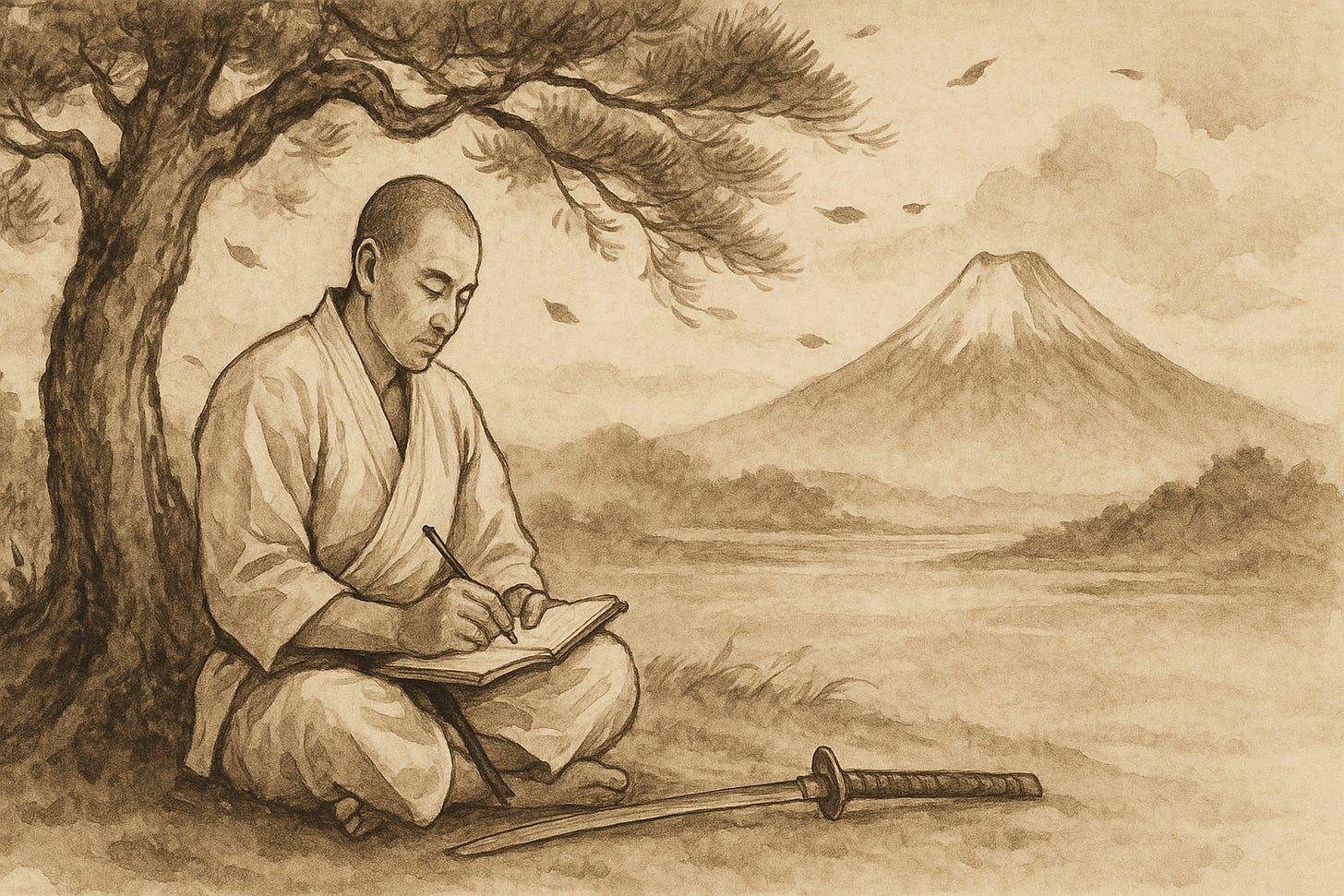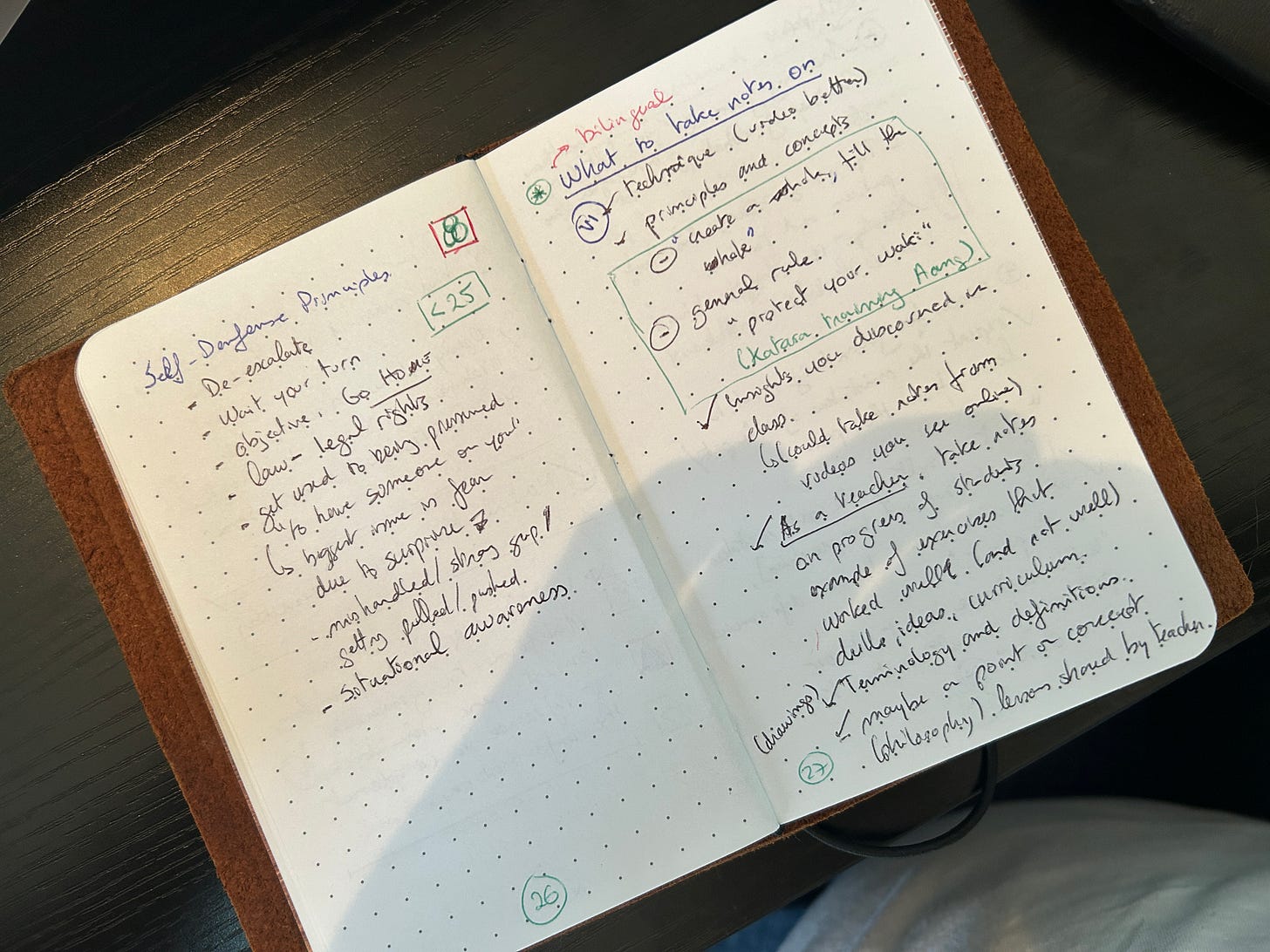When people think of martial artists, they usually imagine fighters, athletes, or warriors in constant pursuit of action. And it’s true, most martial artists are doers. We train, we sweat, we push through pain. Ours is a world built on repetition, on muscle memory, on doing rather than thinking.
But that doesn’t have to be the full story.
Throughout history, some of the greatest martial artists were also philosophers. Think of Miyamoto Musashi, whose Book of Five Rings has inspired not only swordsmen but business leaders and strategists alike. Or Masutatsu Oyama, who didn’t just create Kyokushin but wrote extensively on character, discipline, and the spirit of karate. More recently, figures like Geoff Thompson and Daniele Bolelli have stepped into that same tradition, martial artists who reflect, write, and seek meaning beyond the mat.
There’s a lesson here.
Martial arts is not just about movement. It’s about meaning.
Notebooks as a Path to Philosophy
In an earlier article, I wrote about the value of taking notes in martial arts. For students, it’s a tool to reinforce memory. For teachers, a way to track progress and organize classes. But there’s another side to note-taking that I didn’t explore as deeply: its power to sharpen your thinking.
Writing slows you down. It forces you to ask questions. Why does this technique work? What’s the principle behind it? Where else have I seen this idea before? Over time, your notebook becomes more than just a training log, it becomes a place to think. To refine. To connect ideas.
“Seek what the master sought,” goes the saying. That pursuit isn’t just physical—it’s intellectual, even spiritual.
Your notes evolve from descriptions of drills to reflections on rhythm, timing, presence. You stop writing “how” and start asking “why.”
This is where philosophy begins… hopefully.
The Hidden Thinkers of the Martial World
We don’t often think of martial artists as scholars, but maybe we should. There’s something deeply philosophical about grappling with fear, confronting pain, testing your limits, and striving to live with integrity. In fact, many martial philosophies overlap with classical schools of thought such as Stoicism, Zen and Taoism (Stoicism being my personal favorite). My Stoic philosophers were also into combat sports such as boxing and grappling.
"Be a boxer, not a gladiator, in the way you act on your principles. The gladiator takes up his sword only to put it down again, but the boxer is never without his fist and has only to clench it." - Marcus Aurelius
Musashi wasn’t just teaching tactics; he was talking about emptiness, awareness, and perception. Oyama didn’t just promote hard training; he insisted that karate be a vehicle for self-discipline and character.
Even modern martial arts nerds, those of us who read books, jot thoughts in the margins, watch old fights and pause to write things down, are walking a path that’s more scholarly than we may admit.
We’re not just collecting techniques. We’re making sense of them.
Your Notebook as a Dojo for the Mind
If your body trains in the dojo, then your notebook is where your mind trains. This is something I’ve come to appreciate more with time. In mine, you’ll find lists of techniques, yes, but also ideas and unrefined thoughts. Questions that don’t yet have answers. Personal theories that need testing.
I often flip through old pages and rediscover something I wrote a while ago, or similar / repeated thoughts (hint of something I need to iron out). Other times, I’ll sit with a phrase from class, a specific quote I want to remember or a inkling of a thought and turn it over in my mind until it reveals something deeper.
This isn’t academic. It’s personal. And if you let it, it becomes powerful.
A Tradition Worth Reviving
We don’t need to separate the physical from the philosophical. They’ve always belonged together. The warrior-poet is not a myth, it’s a model, one we can each step into in our own way.
You don’t need to write a book.
You don’t need to quote Laozi or Epictetus.
You just need to be curious enough to think about what you’re doing and brave enough to write it down, even if it is just for you. Martial arts isn’t just about what happens on the mat. It’s also about what stays with you after you bow out. And sometimes, that’s not a technique. It’s a thought.










Notebooks are a great idea! I also think that writing things down gets into your subconscious and karate techniques probably are developed and improved in dreams